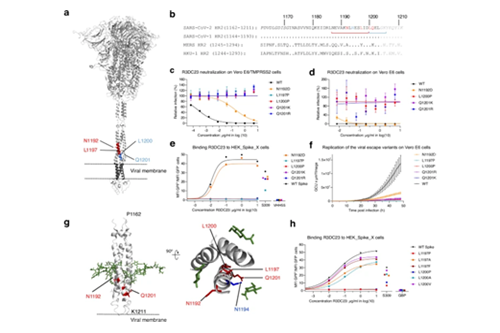Ultrapotent SARS Coronavirus-Neutralizing VHH Antibodies Clamp the Spike at Its Base

The rapid evolution of SARS-CoV-2 variants has significantly compromised the efficacy of many therapeutic monoclonal antibodies derived from the human immune system. As existing mAbs struggle to keep pace with mutating viral epitopes, researchers are turning to alternative platforms — and once again, single-domain antibodies (VHHs) are proving their value.
A New Class of Broad and Potent Neutralizers
In a recent study, scientists identified a panel of VHH antibodies that target a highly conserved region in the S2 subunit of the coronavirus spike protein. Unlike most neutralizing agents that bind to the receptor-binding domain (RBD) — often prone to mutations — these VHHs latch onto the Heptad Repeat 2 (HR2) region at the base of the spike, a site structurally critical and less susceptible to variation.
One standout VHH demonstrates a unique quaternary binding mode, effectively "clamping" the spike trimer in its prefusion state. This prevents the conformational changes necessary for viral fusion and entry, offering a robust mechanism of action even across divergent strains like SARS-CoV-1 and SARS-CoV-2.
In Vivo Protection and Resistance to Escape
When engineered as a VHH-Fc fusion (human IgG1) and administered systemically, this antibody provided full protection in two animal models. Even more impressively, pseudovirus escape assays revealed that while rare mutations could emerge under selective pressure, they rendered the virus nearly non-infectious — suggesting a remarkably high resistance barrier.
Implications for Pandemic Response
These findings establish a promising foundation for the development of pan-sarbecovirus biologics, and highlight the advantage of targeting conserved spike regions beyond the mutable RBD. Furthermore, the same mechanism may be applicable to other class I fusion proteins, broadening the therapeutic relevance beyond coronaviruses.
Conclusion
By locking the viral spike in its prefusion state, these VHH-based antibodies showcase what next-generation antiviral biologics could look like: compact, stable, highly specific, and variant-resistant. For researchers and companies exploring long-term solutions to coronavirus threats, this is an exciting step forward — and a powerful reminder of what single-domain antibodies are capable of.
Source: nature communications